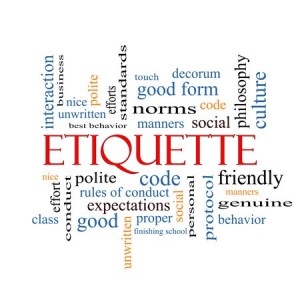National Etiquette Week: Forks and fingers
 Did you know May 12 to 16 is National Etiquette Week (NEW)? Yep, etiquette gets its very own national recognition. It’s not just about using the right fork at a meal, the focus of NEW is to call attention to the importance of courtesy, civility and kindness and practicing good manners in all aspects of our lives.
Did you know May 12 to 16 is National Etiquette Week (NEW)? Yep, etiquette gets its very own national recognition. It’s not just about using the right fork at a meal, the focus of NEW is to call attention to the importance of courtesy, civility and kindness and practicing good manners in all aspects of our lives.
I’m reading a book called From Hand To Mouth, Or, How We Invented Knives, Forks, Spoons, and Chopsticks & The Table Manners To Go With Them. It’s really quite interesting how our eating habits and utensil use changed over the centuries. The fork wasn’t widely used until the mid-1600s. Until that time food was eaten with one’s fingers and a sharp knife.
A popular etiquette book for children was written in 1530 by Dutch thinker Erasmus, titled On Civility Of Children. In it he encouraged children to pay attention to their table manners. Remember, people still ate with their fingers at that time. Here are some examples:
Take care to cut and clean your fingernails before dining. Otherwise dirt from under the nails may get in the food.
Don’t be the first to reach into the pot: only wolves and gluttons do that. And don’t put your whole hand into it – use only three fingers at most.
Take the first piece of meat or fish that you touch and don’t poke around in the pot for a bigger one.
Don’t pick your nose while eating and then reach for more food.
If your fingers become greasy, it is not polite to lick them or wipe them on your coat. Bring a cloth along for this purpose if your host does not provide one. Or else wipe them on a tablecloth.
As you can see, table manners have come a long way in the past several centuries. But etiquette is not just about table manners. Etiquette defines the rules for how we present ourselves and interact with others. It is conventional guidelines that regulate social and business behavior and it evolves to cover our changing culture. You would find no mention of smart phones, email, women in the workforce or how to address a gay married couple in an etiquette book from the early 19th century.
The one constant in etiquette books dating as far back as 1530 is the importance of kindness, respect and courtesy. Erasmus wrote, “Be lenient toward the offenses of others. A companion ought to not be less dear to you because he has worse manners. There are people who make up for the awkwardness of their behavior by other gifts.” He continued: “If one of your comrades unknowingly gives offense, tell him so alone and say it kindly. That is civility.”
I believe it was Emily Post, author of the very popular book Etiquette written in 1922, who stated something like this; Etiquette is knowing which fork to use, manners is not saying anything when your dining companion doesn’t. And, that’s what it’s all about.
I’ll post some interesting etiquette facts throughout the week in honor of National Etiquette Week. I encourage you to share the etiquette practices that you learned that you either hold dear or that you think are unnecessary.
Please note: We have a new method of delivering blog posts to your inbox. If you have previously received these blog posts through Feedburner, please subscribe to receive these blog posts through the form below and unsubscribe to the posts you receive through Feedburner.

 Sign up for the award-winning Clise Etiquette newsletter and receive a free chapter of Arden's book Spinach in Your Boss's Teeth.
Sign up for the award-winning Clise Etiquette newsletter and receive a free chapter of Arden's book Spinach in Your Boss's Teeth.
Leave a Comment